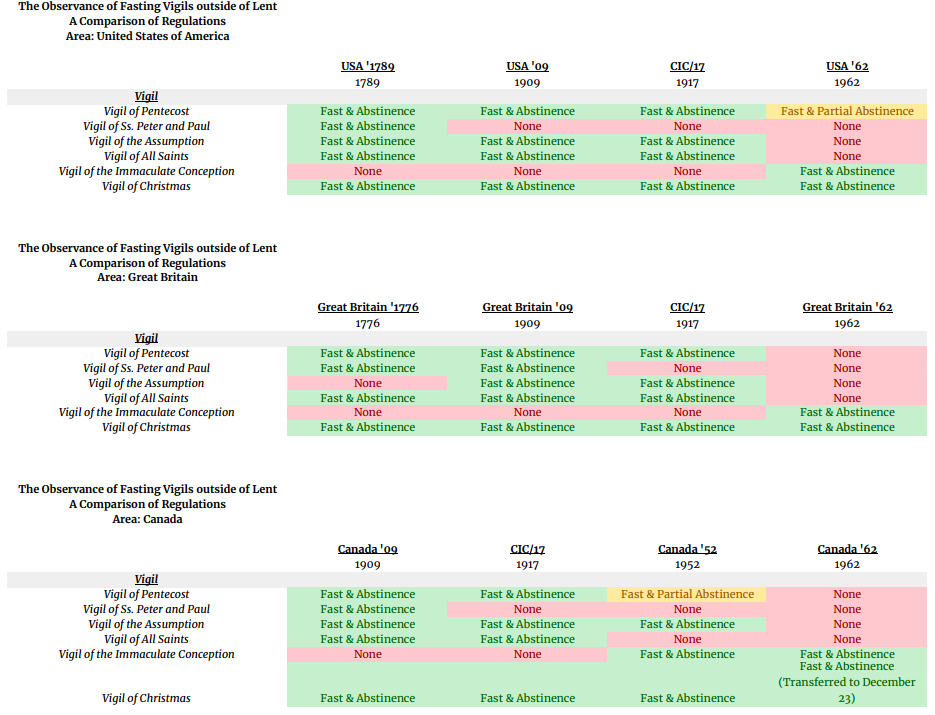At the blog A Catholic Life there is an interesting post, with a graphic, that explains how, over the years, fasting changed for liturgical vigils.
You can draw your own conclusions, but I think it is telling.
It is well worth the time to visit that blog and read that post. He has not only the graphic, below (thanks in advance, well done), but definitions of terms and explanations which you should see. Quite instructive.



































Thank you for alerting us to this post. I look forward to incorporating this into my life. I think this will contribute greatly to my participation in these feast days.
My view is that if every Catholic could follow the 1962 discipline, we would be a much stronger Church. It goes without saying that the current law has ZERO fasting and/or abstinence for any vigil. Let’s start with following the 1962 discipline before lamenting the loss of the 1789 discipline.
If he could just set his partisan spirit somewhere else.
NB: A Mass using the Sunday propers that is anticipated (i.e., offered) on a Saturday evening is sometimes, though incorrectly, called a vigil. This practice, however, is a post-Vatican II novelty and not part of Catholic Tradition… so far he is correct …, so I counsel Catholics to never attend such “vigil Masses” on Saturday evenings.
When the Church has done something I, maybe quite rightly, think in an ideal world she should not have done, – I even agree as far as that – of course no other thing for me as to have nothing to do with it, and counsel others likewise. Good grief.
Whereas:
1. Some of the anticipated feastday Masses in the Novus Ordo, like for Christmas and Peter&Paul (and the Assumption? perhaps even All Saints?) actually are the Vigils, as a glance at the Mass propers makes clear.
2. While traditionally there were no anticipated Sunday Masses (and no evening Masses at all), the anticipation of Sunday on Saturday Evening as such is not antitraditional. It really does begin with First Vespers.
3. Coincidentally, having an Anticipated All Saints Mass, even if the Beatitudes are from Matthew and not Luke, is actually more traditional than having a Votive Mass of (Halloween is a Thursday this year) the Blessed Sacrament or something else.
4. There is one barely tolerable, but existing, and several perfectly fine reasons to attend anticipated Sunday Masses, ever since the Church has allowed them and as long as she is going to do so.
i) “I don’t like to go to Mass, but I will fulfill the minimum of my duty to be free to do what I like.” This is of course the barely tolerable one, and of course an attitude to be grown out of. But it does serve some purpose in not severing the tie with the Church altogether. The Saturday Evening Mass is rather popular with the less-than-ideally-pious youth from Catholic families; probably for a reason.
ii) “I want to go to Mass on Saturday, either because I go every day, or because I have a good opportunity on Saturday because I don’t work then, or because I want to honor our Lady whose day-of-the-week it is, or because there is some feast on the day, or because in Eastern-Orthodox style I want to keep some remembrance of the feastday of the Old Testament (however heretic the Seventh-Day Adventists are), or a combination of some or all of the above. Also, I do attend Evening Masses. And I had no time in the morning, or it was inconvenient then and it’s not a duty after all. Of course I plan to go on Sunday again.
That the Mass is not of the feast is of minor relevance here. Mass is mass; and if it were a vetus-ordo with a silent Mass setting you could just read the other texts on your own. I, for instance, went to the Anticipated Sunday Mass for this reason last Saturday: it was both the Saturday in Reparition for our Lady’s Heart, and the final day of Seven-Day Easter as the tradition wanted it… but I had not been in the morning. (Well, I was late only in for the sermon in the evening, but there goes.)
iii) I want to start the Sunday. If someone sang First Vespers around here, I actually would prefer to go there, but noone does.
iv) There’s this community I feel attached to that organizes a Mass here. (Saturday evening seems to be a very popular choice here, with the expectation that though they don’t strictly have to, people will be back in their parishes on Sunday morning… which shows some good Catholic sense, to me: not to neglect the parish, but not shying away from meeting other Catholics either.
v) They will sing Solemn Vespers on Sunday tomorrow, so I’ll prefer to go to Mass now, then have a rushing party-night (let’s assume it’s not Lent, will we?) and then be back in Church for Vespers. (Yes, it would feel off – the “barely tolerable, no. i above – thing not to go to Church on “civil Sunday” at all, except perhaps very very occasionally and if there is neither Vespers nor evening Mass… but if there is?
vi) I actually don’t have time on Sunday for a reason which under preconciliar rules would have allowed me to skip Mass altogether.
vii) I actually don’t have time on Sunday for a reason which maybe not reaches that point but it’s somewhat close. (Thinking of “I’m on some family feast or trip and my family does not practice the Faith” here.)
viii) I want to hear what the preacher preaches on these texts.
Etc.
Excuse the rant about an aside that was not the point of either the blog or you, Reverend Father.